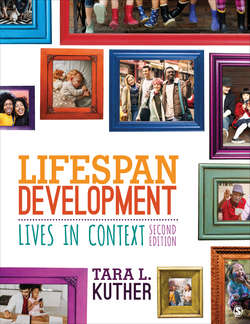Читать книгу Lifespan Development - Tara L. Kuther - Страница 410
На сайте Литреса книга снята с продажи.
Cultural Influences on Development Children’s Participation in Household Work
ОглавлениеSocieties differ along many dimensions that have implications for children’s socioemotional development. Children in collectivist societies that foster group orientation tend to show more other-oriented behavior than do children in more individualist societies. For example, Israeli children from kibbutz communities, which typically emphasize communal living and high cooperation to meet shared goals, have been shown to display more prosocial, cooperative, and otherwise other-oriented behaviors compared with their urban-dwelling peers.
In a groundbreaking study of children in six cultures, Whiting and Whiting (1975) observed that children’s prosocial behavior varied with culture. Children in Mexico and the Philippines were more often observed offering help and support (e.g., by offering food, toys, and information) than were children in Okinawa, India, and the United States. Children in rural Kenya, the most traditional society of those studied, demonstrated the most pronounced levels of helpful behavior. The differences in prosocial behavior are influenced by cultural and contextual differences, such as the tendency for people to live together in extended families. The most prosocial children lived in cultures where the female role was important to the family’s economic well-being, and children were assigned chores and responsibilities at an early age and were expected to contribute to the family’s well-being.
Cultures vary widely in the degree to which children are expected to aid the family by participating in household and economic work—activities that offer opportunities for prosocial development (Lancy, 2008; Ochs & Izquierdo, 2009). Although Western industrialized societies tend to conceptualize childhood as an innocent, playful period free from labor, children in many societies participate extensively in household and economic labor. In these societies, adults naturally scale down responsibilities to match children’s developmental stage and capabilities (Lancy, 2008). Participation in work often begins by children simply being present and watching adults’ activities (Paradise & Rogoff, 2009). Young children and toddlers might perform simple tasks in close proximity to adults and later on their own (Ochs & Izquierdo, 2009). For example, Tarong parents express strong expectations for prosocial behavior and expect children as young as 3 or 4 years of age to contribute to household and wage labor by performing simple tasks such as pushing a baby’s hammock or helping string tobacco leaves (Guzman, Do, & Kok, 2014). Alternatively, children might engage in work alongside adults but be expected to produce less, as in the case of Mikea children in Madagascar who forage for edibles as part of adult groups but are not expected to accomplish the same level of success (Tucker & Young, 2005). Compared with able-bodied adults, children might gather younger tubers that are easier to dig for or gather and carry fewer nuts and fruits. Older Tarong children, at 6 or 7 years of age, are expected to participate in more sophisticated ways, such as tending to animals or helping to gather weeds, prepare food, or clean the home (Guzman et al., 2014). From these examples, we can see that cultures and economic environments vary dramatically in their expectations for children’s behavior, with implications for their development.
